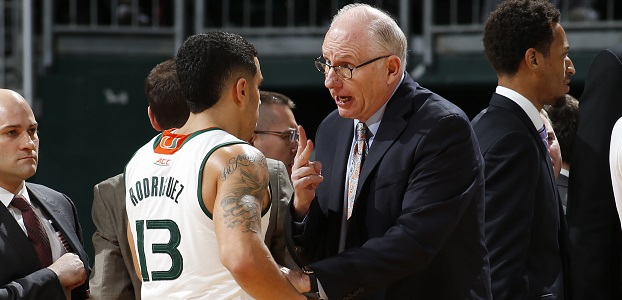There are times when a coach has to step back and let his players play. Trust their instincts, even if it’s not really what they’re taught.
And now Angel Rodriguez has a story he can tell his grandchildren – that the 5-foot-11 point guard tipped the ball in the basket for the winning points. Miami’s men’s basketball team avoided overtime against Pittsburgh in a 65-63 win when Rodriguez tipped in the game-winner, and with his left hand, mind you.
“You know, what’s funny is we were talking about making athletic plays,” Rodriguez said. “We were joking that I’m short. Now, I have something to brag about now.”
Yes he does. And his play keeps Miami (19-4, 8-3) in the thick of the ACC race. Just two games separate the top six teams. And Duke (18-6, 7-4) still gets to play North Carolina (20-4, 9-2) twice.
So many college basketball coaches love to show their ego – and hurt the flow, rhythm and unpredictability of the final seconds – by calling timeouts. Often, the play drawn up does nothing because there’s too little time on the clock, the play is too scripted and well, the guy on the other bench is pretty good at defensive strategy.
But as big of a controller as he was, Bobby Knight often did not call a “T.O.” late, baby. He figured he taught them in practice and it was their job to execute at the end of games. Same thing with a season. The best coaches and players in any sport will tell you that at the beginning and middle of the season, coaches coach and players play.
But with championship teams, chemistry and trust is so strong at the end of the season that what happens is players take ownership of the team and coaches step back and watch the magic. New rules don’t allow coaches to call timeouts in live-ball situations; but if a coach asks for it, his players are going to call “T.O.”
Tuesday night, Miami coach Jim Larranaga said, “Maybe I should have” called a timeout after Pitt’s James Robinson nailed a 3-pointer with 31 seconds left to tie the game. But he didn’t.
“I was hoping coach didn’t call a timeout,” Rodriguez said. “The game was tied and I was giving him the hand, like, ‘Please, just let us play it.’ He did. He trusted us. They went in a zone, from man to zone quickly, but they seemed to lose Sheldon (McClellan). I wanted to throw it as soon as I saw him, but it would have been too early. They probably would have had a chance to score if he happened to miss. I waited, he still was open, and I gave it to him. I thought that was in for sure, given the fact that he’s such a great shooter.”
Normally, a point guard is supposed to stay back but Rodriguez figured with less than 2 seconds left, he’d go into the paint. “I know my job is to get back, like coach says, but there was not a whole lot of time, and I figured I might as well take a gamble, and it ended up paying off,” he said.
Larranaga, who had a stern 1-on-1 meeting on the court with Rodriguez after a timeout earlier in the game, joked, “He didn’t listen to me throughout the game anyway, so I’m glad he didn’t listen at the end. “That was a major league play for the smallest guy on the floor to go over everybody, time it right and just tip it in.”
If Miami continues making a run in the postseason, this could be one of those signature moments. There’s always a risk. There could be a nip-and-tuck game down the road, Rodriguez tries to do the same thing with more time on the clock and Miami gets burned for a last-second basket and loss. But Larranaga has a veteran team and if he’s willing, times like these are perfect to let them take ownership. And wouldn’t it be something if – on the 10-year anniversary of Larranaga taking George Mason to the Final Four – he pulls off the same thing with this Miami team?

















